#postmodernist works
Text

interiorfox_
Sarpi Border Checkpoint: A Brutalist Checkpoint Watching Over the Border
This brutalist customs checkpoint was built in 2011 and it is located in Sarpi, Georgia. Overlooking the Black Sea, Sarpi Border Checkpoint with its cantilevering terraces watches over the Georgian border to Turkey. Multiple levels of the building overlook the water and the steep coastline. The architect of the checkpoint, Jürgen Mayer H. is a German architect famous for his postmodernist works like the Miami Museum Garage.

somebrut_somewax

antiprada

brutal_architecture
#interiorfox_#photographer#sarpi border checkpoint#brutalist checkpoint#architecture#sarpi#georgia#black sea#turkey#jurgen mayer h.#german architect#postmodernist works#somebrut_somewax#antiprada#brutal_architecture
1 note
·
View note
Text
You find a magical crystal (or genie or whatever) that lets you rewrite physics and history to comply with the conventions of one genre. Things are mostly the same and life remains grounded (you still work the nine to five and pay rent), but the tropes and logic of that genre are now mundane, complied with by all parties, and expected in place of reality's.
#i left out character centric genres like romance#and complete overhauls like sci fi#i want a world like our own just with different rules#no you may not live in a postmodernist work#im sorry bud#my posts
16 notes
·
View notes
Text
series of dominoes where the first one says "martin luther posts the 95 theses" and the last one says "every contemporary book, movie, game, fanfiction protagonist is snarky and sassy as a mirror for an audience that is in constant dialogue with the text"
#feel free to steal my idea and use it to get clout in academia. just remember where you came from yk#no seriously I do think it's an interesting thesis (heh)#protestantism encouraged believers to interpret and even question (to an extent) scripture#protestantism spreads like crazy and is very very heavily tied to the rise of capitalism and capitalist values#i.e. protestant work ethic etc#every writer now feels the need to have a self-aware protagonist commenting on the occurences in the text as a wink to the audience#it's deep-rooted protestant values making out sloppy with postmodernist reevaluation and skepticism of narratives#maybe one day someone will fall in love with me for my beautiful mind.#this post goes out to ann and linda who I know will maybe find it interesting. thank you
3 notes
·
View notes
Text
the most underappreciated fancontent skill is being really good at making pinterest boards
#keep going back to my near deathnote fashion board like. you guys dont know how good this is#i had nothing to work with and i created him from fashion crime ashes like a minimalist postmodernist phoenix
17 notes
·
View notes
Text
i see so many people getting mad at postmodern/contemporary art all the time and it always takes me by surprise, like i forget we aren’t all living in a constant state of romanticizing pointlessness
#i always forget that its like a common thing to dislike#to me the feeling evoked by any work of art matters more than skill or mastery#i find myself drawn towards simplicity more often than not#which usually ends up looking like a mesh between modernist and postmodernist values but whatever#sometimes i wish people would stop arguing about what is and isnt art like come follow me there are better hills to die on#anyway.#🦀txt
2 notes
·
View notes
Text
This week on things Lettie is becoming insane about: Modernist architecture and industrial design
#unpopular tumblr opinion but I really do like modernism and a bit of minimalism here and there#I do love postmodernist architecture too and that’s probably next on the schedule#denys lasdun is my favourite architect btw#I guess because I’ve seen so many of his works in person in comparison to other architects#the design behind keeling house is quite pleasant and refreshing and finding out they went from council houses to luxury apartments sucks
1 note
·
View note
Text
(typing noises)
#hewwo#(the audience starts sweating)#turns out my writer's block is strictly for my OG work 😭 why#anyway.#being stuck in tetanus bay is having Effects on me#you can only read so much postmodernist / catholic guilt / french medieval / [redacted] fanfiction Texts before you get bored#those arent all the same text. if you DO find fanfic that has postmodernist french medieval catholic guilt in it CONTACT ME IMMEDIATELY#MY NUMBER IS 0998 39-
3 notes
·
View notes
Text
Frank Gehry's Ruminations Are Beautiful Fish and Crocodile Lamps
Frank Gehry titillates New Yorkers with his ruminations of beautiful fish and crocodile lamp sculptures and works on paper at the Gagosian.
Frank Gehry titillates New Yorkers with his ruminations of beautiful fish and crocodile lamp sculptures and works on paper.
Two fish lamp sculptures in a dialogue. Installation view of Frank Gehry’s Ruminations at the Gagosian Gallery. © Frank O. Gehry, courtesy of Gagosian. Photo: Maris Hutchinson
BY KAZEEM ADELEKE, ARTCENTRON
NEW YORK, NY—Ruminations, an exhibition of new sculptures and…

View On WordPress
#Architectural Designs#Artistic Vision#Crocodile Lamp#Fish Lamps#Frank Gehry#Organic Shapes#Postmodernist Architecture#Ruminations#Sculpture#Works on Paper
0 notes
Text
🥕 Little "first page" of a short story
I hope it makes sense. If not, I hope, at least, the writing is yummy.
"Could you even try to be any slower?” Tremor drawls slowly in his creaky voice. The Wasted jumps at the sudden noise.
Mutt rolls his eyes, growls back tauntingly through gritted fangs, “Could you?”
“Shut up, you lot. Let’s get a move on, already. I’m famished.” The Wendigo’s dark eye sockets, gaping holes in his skull, seem to gleam with impatience.
“Yeah, yeah, whatever. You’re always starving, Glutton, we know.” The snide chuckles are quickly silenced by the annoyed gnashing of teeth.
A hard tug on the locked doors, the rattling of metal echoing through the empty streets, and they are set briskly on their separate ways. Glutton and Tremor will be in the draughty, bleak dormitories by sundown. Mutt huffs at the thought, doesn’t watch them go.
He grumbles silently, I am not paid enough for my job, then snickers: I am hardly paid. The glittering gold that is spread so abundantly amongst Workers seems priceless, and it is. Everyone dies in death for it, but it is simply meaningless. That’s funny. Priceless. Price-less. How ironic. He chuckles to himself.
A nervous noise from somewhere behind Mutt does not startle him. There is nothing to care for in life: nothing to love, and thus nothing to fear. Annoyance churns alone inside him, then becomes amusement.
“Come along, bud. Ready to die?” Mutt turns, flicks his ear, motions for the Wasted to follow. The vague memory of an introduction surfaces briefly; he waves it away. The Wasted’s name is unimportant. Next sunrise, Mutt will be standing in the same place, uttering the same words.
The Wasted pauses, swallows, and tries to joke, “I- I think I’ve already done that, sir.”
Mutt barks loudly. “You funny thing,” he howls, “quit joking. Jokes aren’t for you lot. You still care.”
The Wasted fails to utter the strength to protest, and trudges behind Mutt, thinking there is nothing more to lose. Funny thing, Mutt remarks silently, quite funny, and so wrong. Just like all the others.
Mutt leads the Wasted through the affluent neighbourhood. Mutt had visited the dead before, in their bright, colourful, horrible world. The size of the houses on some unassuming hilltop had possibly been even larger than those he walked by now. He rolls his eyes at the memory: silly people. They even call themselves ‘alive’. I do not understand.
“These are sweet houses,” the Wasted remarks timidly. Mutt shrugs.
“They are.” His bland reply.
“Who could ever afford to live here?”
Mutt chuckles, mutters knowingly, “no one. No one ever affords it, funny thing. It is given to them freely.”
“How?” Even now, Greed is crawling through the Wasted’s words. Tremor would laugh so much they’d cause an earthquake, when I tell them this.
“So many questions.” Mutt laughs. “It is for those with small noses.” The Wasted reaches a hand up to its face wondrously.
“That’s hardly fair. People with, I dunno, big noses, I guess, didn’t choose to have them!”
Mutt needs not reply; they arrive at the Doorway, which is hardly a doorway at all, but simply the yawning mouth of a cave, whose inside is infinitely dark. The Wasted shivers.
“So.. this is it?”
“You seem unimpressed. What do you stall for? You may go back to ‘life’, now, like you lot have worked so hard for.”
“Yes, but..” The Wasted trails off, Mutt talking over his dawdling words. The Wasted thinks what all Wasteds think: why? Why live? What’s it worth? Mutt has heard too much of it.
“Go. You asked for this. You can come visit us anytime, though I wouldn’t care.” Impatient, he snaps at the pathetic Wasted, and the wretched thing flees into the cave.
He calls out after the Wasted, “You’ll soon find that our “death”, as you call it, is simply your “life”, with less lies.”
0 notes
Text
i genuinely wonder if there are going to be young people who were raised in gender ideology who honestly do not know that homosexuality exists. like as of now i mostly come across people who are old enough where they grew up knowing about same sex attraction, who remember the fight for same sex marriage, but now are working to unlearn that whole concept in favor of gender based attraction. but are there going to be children raised in kweer begendered postmodernist circles who will never be introduced to the reality of biological female people who are naturally exclusively attracted to other biological female people... like theyre teaching the genderbread person to elementary schoolers. bisexuality is being taught as “two or more genders.” lesbian is “non men attracted to non men.” if you ask how lesbians have sex they include people with penises in the equation. this is the information being given to young people now. they arent unlearning anything from the 90s and early 2000s, this is the first thing theyre being taught about sexuality
958 notes
·
View notes
Text
“During the same twenty-five year period that feminist theory and practice have been ongoing, a trend in theory called postmodernism has been working on undoing it. Its main target is, precisely, reality.

Part of the problem in coming to grips with postmodernism is that, pretending to be profound while being merely obscure (many are fooled), slathering subjects with words, its selfproclaimed practitioners fairly often don’t say much of anything. A splendid illustration is the parody of postmodern writing that was in fact gibberish that was accepted and published in a leading postmodern journal (see Alan D. Sokal's Transgressing the Boundaries: Toward a Transformative Hermeneutics of Quantum Gravity.)

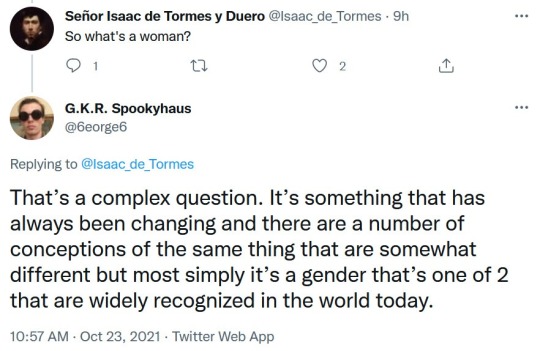
Postmodernism as practiced often comes across as style— petulant, joyriding, more posture than position. But it has a method, making metaphysics far from dead. Its approach and its position, its posture toward the world and its view of what is real, is that it’s all mental. Postmodernism imagines that society happens in your head.

What [feminists] said was credible because it was real. Few people claimed that women were not violated in the ways we had found or did not occupy a second class status in society. Not many openly disputed that what we had uncovered did, in fact, exist. What was said instead was that, in society, nothing really exists.
Even questioning in the name of “differences” whether “women” exist and can be spoken of.
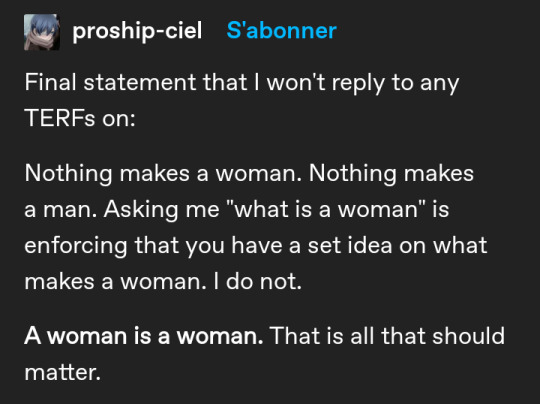
Antiessentialism is one facet of this objection: the view that there is no such thing as “women” because there are always other aspects to women’s identities and bases other than sex for their oppressions. The defense of multiculturalism is another facet of it: there is no such thing as women in the singular, there are only women in the plural, many different particularized, localized, socially constructed, culturally modified women, hence no “women” in what postmodernists imagine is the feminist sense.
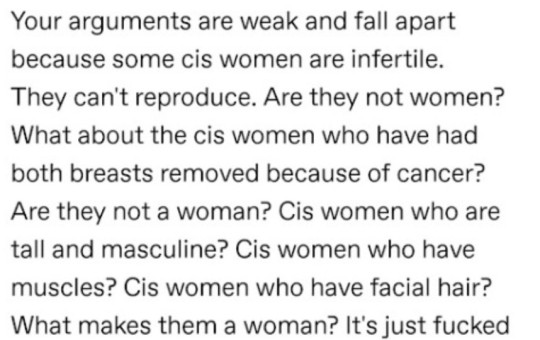
The postmodern critique of feminism seems to assume that the “women” of feminist theory are all the same, homogeneous, a uniform unit. I do not know where they got this idea either. Not from me. They don’t say. This notion that everyone must be the same to have access to the label “women” is not an idea that operates in feminist theory to my knowledge. Women, in feminist theory, are concrete; they are not abstract. In fact, feminism in one sense started the critique of universality as currently practiced by showing how women are left out of the human episteme.
Domination, postmodernists know exists, but they don’t tell us how or where or why. It is something that no one does. What we used to call “what happened to her,” has become, at its most credible, “narrative”. But real harm has ceased to exist. So whole chapters of books with “pornography” in their titles can be written without ever once talking about what the pornography industry concretely does, who they are, or what is done to whom in and with the materials.

Abuse has become “agency”—or rather challenges to sexual abuse have been replaced by invocations of “agency,” women’s violation become the sneering wound of a “victim” pinned in arch quotation marks. Instead of facing what was done to women when we were violated, we are told how much freedom we had at the time. Postmodernists ought to have to confront the human pain of the ideas they think are so much fun.
Postmodern feminists seldom build on or refer to the real lives of real women directly; mostly, they build on the work of French men, if selectively and often not very well. Feminist postmodernism is far, far away from the realities of the subordination of women. All women should be so fortunate. Postmodernists have to portray women actually having power that men largely have in order to confuse people about power. (That they want to avoid being called sexist in the process, we have accomplished.)
What postmodernists want, I have come to think, apart from to live in their heads instead of in the world (that old dodge), is to vault themselves out of power methodologically. They want to beat dominance at its own game, which is usually called dominating. They want to win every argument in advance.
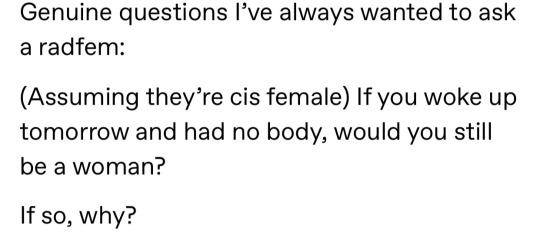
The reason that it doesn’t appear to men (especially men of the theory class) that the world exists independently of their minds is because they largely do have the power to do whatever happens in their minds.
Women are in a position to know this to the extent that reality does not respond to us. What we know is that the power to make reality be real is a product of social power to act, not just to imagine. We know that reality is about power because we can imagine change all day long and nothing is any different. The reality of people who don’t have power exists independently of what they think. The social constructs that control their lives very often are not their constructs. Any woman who doesn’t know this, in my opinion, has not pushed very hard on the walls around her and other women, or has been, so far, very privileged and very lucky.
This is a criticism; it is not an inevitability. We can collectively intervene in social life, but not if we deny that it is there or what makes it be there.

What does this suggest about their ability to promote change? What is postmodernism’s project? How linear, how teleological, how serious. To whom and what is it accountable? I say it is accountable to academic hierarchy. Who else can afford this theory? Postmodernism appropriates its methodological pretensions and gestures from feminism, but it doesn’t practice them.
So it’s forward to the past: to yet another set of abstractions with no accountability to subordinated peoples’ reality and an implicit but total accountability to power, with familiar if fancier reasons for doing nothing—radicalsounding, but with the same origins, a dislocated elite, and the same consequences, a disengaged theory, that corrodes material resistance to power.

Postmodernism’s analysis of the social construction of reality is stolen from feminism and the left but gutted of substantive content— producing Marxism without the working class, feminism without women. It’s an abstract critique of abstract subjects. The hall of mirrors (that’s plural) that much of postmodernism substitutes for any attempt to grasp a real social world is an ultimate collapse into liberalism’s relativism regresses.
Once postmodernism’s various acts of theft and sell-out are exposed, what is left is a pose, an empty gesture of theatrical anarchism (to which Marx’s critique applies), a Hegelian negation of the status quo (and just as determined by it), liberalism’s terrible child (many liberals look plenty grounded and engaged by comparison), a precious politics of abdication and passivism.
I do know this: we cannot have this postmodernism and still have a meaningful practice of women’s human rights, far less a women’s movement.

Postmodernism, empty as much of it is, is taking up a lot of feminist theoretical energy in this one world that we all go to sleep in and wake up in. Postmodernism is an academic theory, originating in academia with an academic elite, not in the world of women and men, where feminist theory is rooted. In the early 1970s, I (for one) had imagined that feminists doing theory would retheorize life in the concrete rather than spend the next three decades on metatheory, talking about theory, rehashing over and over in this disconnected way how theory should be done, leaving women’s lives twisting in the wind.
My feeling is, if the postmodernists took responsibility for changing even one real thing, they would learn more about theory than everything they have written to date put together. Instead, as practiced by postmodernists, the job of theory, as the blood sport of the academic cutting edge, is to observe and pass on and play with these big questions, out of touch with and unaccountable to the lives of the unequal. Their critically-minded students are taught that nothing is real, that disengagement is smart (not to mention careerpromoting), that politics is pantomime and ventriloquism, that reality is a text (reading is safer than acting any day), that creative misreading is resistance (you feel so radical and comfortably marginal), that nothing can be changed (you can only amuse yourself). With power left standing, the feminism of this theory cannot be proven by any living woman. It is time to ask these people: what are you doing?”
Points On Postmodernism by Catharine MacKinnon
2K notes
·
View notes
Text
people who say „its just sex“ in regards to prostitution and porn (the commodification of sex and introduction of financial incentives which is inherently at odds with freely given consent) have to be either virgins (no personal experience), traumatised and not worked through it (regarding sexual abuse as the norm rather than an issue), completely fooled by whatever is popular right now (leftists and liberals who buy the „sex work is work“ and postmodernist crap), questionable in their own sexual conduct (not recognising or respecting boundaries and seeing the other person as fully human by pushing your own desires on them) or straight up lying (either to cope or to dodge accountability).
59 notes
·
View notes
Note
top 5 books you've ever read (no genre distinction)
LOVE this question. spent a whole day stewing over it. i'm afraid i'm experiencing heavy recency bias here and there will also have to be some honourable mentions. but let's go (in no particular order)
brokeback mountain by annie proulx. now. when i tell you i could talk about this story (later published as its own book, originally published in the new yorker sans prologue (which was deliberate, thank you, wikipedia, i have Been to the Archives and i Know) and then published in the collection close range) for literal hours, i mean it. i wrote a prize-winning essay on it during my masters, examining its drafting process and what that process itself implies about queer temporality and the value of the unsaid against the great big american myths of rural frontier masculinity that don't match up to a modern world (or any world at all). if anyone wants a more detailed post on this i would Love to talk about it more. but for now, please go read this book. it's utterly transformative and maybe the best queer work of fiction i've ever read.
house of leaves by mark z. danielewski. EXTREMELY different vibe from proulx, oh boy. this is where i out myself as a postmodernist with a great enthusiasm for the big 'bros' of the scene - pynchon, delillo, later franzen and foster wallace. house of leaves is really a post-postmodern work, which is my favourite sort (i suppose a recent example would be no one is talking about this by patricia lockwood) in that its examination of literary artifice and the unreality of the world leads not towards ironic futility but to something even approaching optimism, ie. the new sincerity. this is not to say that house of leaves is a feel good work, oh no. oh boy. it's absolutely bonkers and utterly compelling, and you get a lot of weird looks when you have to use your phone camera as a mirror to understand bits of it on a packed flight into jfk. it combines two of my favourite things: postmodernism and horror. it's perfect.
in the dream house by carmen maria machado. i wrote my master's dissertation on this and it's utterly beautiful. it interacts with fiction and genre in a transformative way — and i use that in the OTW sense, the henry jenkins participatory culture sense, yes i did essentially write my masters dissertation about fanfic. machado's memoir is so interesting as a work of resistance to and celebration of genre — the media that has erased her as a queer woman suffering domestic violence, the media that she loves.
slaughterhouse five by kurt vonnegut. yes, there had to be another postmodernist on this list. i've read a lot of his work now and it's always brilliant, but this is his most famous for a reason. engages with war, temporality, and nihilism in such a moving and memorable way. there's a reason a vonnegut reference (so it goes) creeps into everything i write
lolita by vladimir nabokov. yeah, i'm including the Discourse Book. please feel free to unfollow me. a lot of eloquent writing already exists out there on why this novel is genius, so i'll settle on saying as a technical achievement it's utterly insurmountable, as an indictment of american consumer culture it's unparalleled, and as a moral object it makes a lot of people very uncomfortable, which means it's working.
you have no idea how close i was to putting infinite jest on this list. but you asked for the best books i've ever read, not my favourites... and infinite jest is ridiculously flawed. so.
honourable mentions go to: the grapes of wrath (john steinbeck), nevada (imogen binnie), the silmarillion (tolkien), and catch 22 (joseph heller).
thank you for the ask!
42 notes
·
View notes
Text
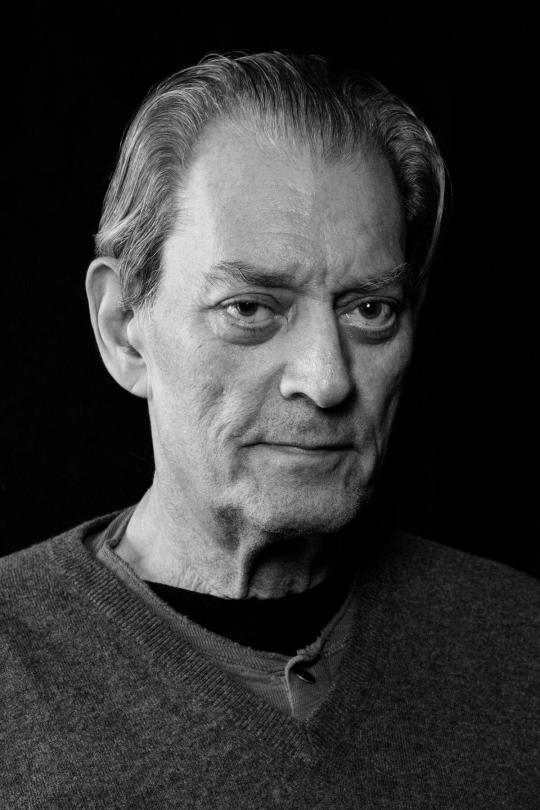
Paul Auster, American author of The New York Trilogy, dies aged 77
The writer of The New York Trilogy, Leviathan and 4 3 2 1 – known for his stylised postmodernist fiction – has died from complications of lung cancer
Paul Auster, the author of 34 books including the acclaimed New York Trilogy, has died aged 77.
The author died on Tuesday due to complications from lung cancer, his friend and fellow author Jacki Lyden confirmed to the Guardian.
Auster became known for his “highly stylised, quirkily riddlesome postmodernist fiction in which narrators are rarely other than unreliable and the bedrock of plot is continually shifting,” the novelist Joyce Carol Oates wrote in 2010.
His stories often play with themes of coincidence, chance and fate. Many of his protagonists are writers themselves, and his body of work is self-referential, with characters from early novels appearing again in later ones.
“Auster has established one of the most distinctive niches in contemporary literature,” wrote critic Michael Dirda in 2008. “His narrative voice is as hypnotic as that of the Ancient Mariner. Start one of his books and by page two you cannot choose but hear.”
The author was born in Newark, New Jersey, in 1947. According to Auster, his writing life began at the age of eight when he missed out on getting an autograph from his baseball hero, Willie Mays, because neither he nor his parents had carried a pencil to the game. From then on, he took a pencil everywhere. “If there’s a pencil in your pocket, there’s a good chance that one day you’ll feel tempted to start using it,” he wrote in a 1995 essay.
While hiking during a summer camp aged 14, Auster witnessed a boy inches away from him getting struck by lightning and dying instantly – an event that he said “absolutely changed” his life and that he thought about “every day”. Chance, “understandably, became a recurring theme in his fiction,” wrote the critic Laura Miller in 2017. A similar incident occurs in Auster’s 2017 Booker-shortlisted novel 4 3 2 1: one of the book’s four versions of protagonist Archie Ferguson runs under a tree at a summer camp and is killed by a falling branch when lightning strikes.
Auster studied at Columbia University before moving to Paris in the early 1970s, where he worked a variety of jobs, including translation, and lived with his “on-again off-again” girlfriend, the writer Lydia Davis, whom he had met while at college. In 1974, they returned to the US and married. In 1977, the couple had a son, Daniel, but separated shortly afterwards.
In January 1979, Auster’s father, Samuel, died, and the event became the seed for the writer’s first memoir, The Invention of Solitude, published in 1982. In it, Auster revealed that his paternal grandfather was shot and killed by his grandmother, who was acquitted on grounds of insanity. “A boy cannot live through this kind of thing without being affected by it as a man,” Auster wrote in reference to his father, with whom he described himself having an “un-movable relationship, cut off from each other on opposite sides of a wall”.
Auster’s breakthrough came with the 1985 publication of City of Glass, the first novel in his New York trilogy. While the books are ostensibly mystery stories, Auster wielded the form to ask existential questions about identity. “The more [Auster’s detectives] stalk their eccentric quarry, the more they seem actually to be stalking the Big Questions – the implications of authorship, the enigmas of epistemology, the veils and masks of language,” wrote the critic and screenwriter Stephen Schiff in 1987.
Auster published regularly throughout the 80s, 90s and 00s, writing more than a dozen novels including Moon Palace (1989), The Music of Chance (1990), The Book of Illusions (2002) and Oracle Night (2003). He also became involved in film, writing the screenplay for Smoke, directed by Wayne Wang, for which he won the Independent Spirit award for best first screenplay in 1995.
In 1981, Auster met the writer Siri Hustvedt and they married the following year. In 1987 they had a daughter, Sophie, who became a singer and actor. Auster’s 1992 novel Leviathan, about a man who accidentally blows himself up, features a character called Iris Vegan, who is the heroine of Hustvedt’s first novel, The Blindfold.
Auster was better known in Europe than in his native United States: “Merely a bestselling author in these parts,” read a 2007 New York magazine article, “Auster is a rock star in Paris.” In 2006, he was awarded Spain’s Prince of Asturias prize for literature, and in 1993 he was given the Prix Médicis Étranger for Leviathan. He was also a Commandeur de l’Ordre des Arts et des Lettres.
In April 2022, Auster and Davis’s son, Daniel, died from a drug overdose. In March 2023, Hustvedt revealed that Auster was being treated for cancer after having been diagnosed the previous December. His final novel, Baumgartner, about a widowed septuagenarian writer, was published in October.
Auster is survived by Hustvedt, their daughter Sophie Auster, his sister Janet Auster, and a grandson.
Daily inspiration. Discover more photos at Just for Books…?
27 notes
·
View notes
Text
Why do I keep seeing recent interviews (both screenshots & videos) of Judith Butler on TikTok 😭😭😭😭 I CANNOT STAND her work 😭 And like, I’ve read it. It is academic word salad. And her recent interviews saying you can’t define what a woman is and that it’s not just biology isn’t a “Judith Butler W” like people keep saying in the comments, it’s her way of staying relevant in academic circles by obscuring material reality, as she is a postmodernist & her entire career has been about prioritizing gender identity over physical sex under the guise of “feminism,” despite how that not only doesn’t help, but actively harms, women by not acknowledging physical sex & advocating for gender abolition. Women is the word in English that means adult human females. Female, in English, means the sex that can bear offspring or produce eggs. Feminism is about liberating women and girls (human females) from the patriarchy/men. Part of that liberation — arguably very large parts — include understanding our bodies and biology, as that’s very important for our health and wellbeing, while simultaneously understanding that that biology, while making us who we are (human females) does not make us lesser than men. It does not dictate our interests or make us less capable than men. Our biology cannot ascribe us societal roles. The only thing our biology does is say if we’re male or female. Acknowledging that we’re animals, a dimorphic species, & have physical differences in our morphology is not shameful and is not prescriptive. It is observation. If you think being a woman inherently has anything tied to it other than existing as a human female, you are sexist, and you are definitely not a feminist.
#I cannot STAND Judith Butler & I absolutely hate postmodernism#me#personal#my thoughts#radfem#women#feminism#radical feminism#patriarchy#misogyny#sexism#academia#postmodernism#Judith Butler#gender#adult human female#humans#biology#sex is biological#gender is ideological
28 notes
·
View notes
Text
actually Sparkle was secretly hired by Aventurine to be the Wise Old Man character in his hero's journey. it's true my uncle works for hoyoverse
actually Sparkle was secretly hired by Diamond and the other Stonehearts to “provide Aventurine whatever assistance he needs”, they just forgot to explain to the crazy postmodernist what they meant by "assistance" and "need" and now she's walking him through an ultra-adversarial bildungsroman. it's true my aunt works at hoyoverse
actually Sparkle was hired by Himeko to provide enrichment in Stelle's enclosure
33 notes
·
View notes